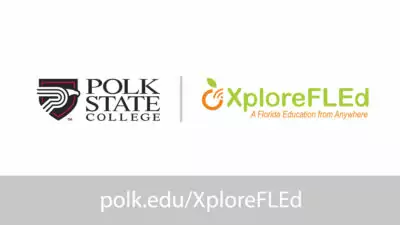Guidelines for Students in the Online Environment
The following guidelines outline the expectations and responsibilities of students utilizing distance learning tools to complete coursework at a distance via the internet.
Getting Help
Canvas
Do you have technical questions in Canvas? Canvas support is available 24 hours a day, 7 days a week. When you are logged into Canvas, you may contact support through the help menu on the left side of the screen. The help menu has the following communication options:
- Chat
- Phone: 1-844-880-9814
- Email: support@instructure.com
If you have trouble accessing MyPolk Email, Canvas, or Polk Portal, call the Polk State College Help Desk at 863-298-6839. The Help Desk is available Monday – Friday 8:00 a.m. – 5:00 p.m.
The Polk State College Help Desk is closed during college holidays.
Getting Started in an Online Course
Registered students gain access to Canvas courses on the first day of the term unless otherwise specified by the instructor. The syllabus and/or link to Basic Course Information (BCI) will be posted when the course opens. Instructions on how to get started in your courses should be available when you log in to your classes. If not, contact your instructor. Online courses begin the first day of the semester and instructors have assignments and/or tasks you need to complete during the first week. It is suggested that students log in and get started on the first day of classes.
Attendance
Do I have to log in at a specific time for an online course?
Be sure to log in the first day of classes (or the first day you add the class during Drop/Add) to your course(s) to avoid being dropped for non-attendance. You can log in any time of the day or night that is convenient. Once you’ve logged in, read your syllabus carefully and thoroughly for important dates and deadlines. Not all courses are the same; class schedules will vary.
Do I have to meet an attendance requirement for an online course?
Yes, just as face-to-face classes require attendance, there are required online activities that verify your attendance. You are required to upload assignments, post discussions, or e-mail the professor by stated deadlines. The syllabus explains the requirements for each course. You must read the syllabus carefully and perform required tasks by the professor’s stated deadlines so you’re not dropped from the course for non-attendance.
Communication
Polk State College interacts with students in a number of ways: E-mail, discussions, chat, assignment feedback, and other forms of contact may be utilized. Student-to-instructor and student-to-student interaction is encouraged. Remember, a professor cannot see when a student has a question in online settings, so it is especially important for students to ask professors questions throughout the term and for students to respond to the professors’ questions. It is equally important for each student to demonstrate regular attendance and progress.
Netiquette Guidelines
Netiquette refers to a set of rules for proper online behavior and applies to tone in student-to-student and student-to-instructor communications. The guidelines include rules for conduct in discussions, e-mail, blogs, chats, online rooms, social networking sites and web conferencing. Aspects of communication content, such as quality, style, and grammar expectations, are also addressed.
Polk State College expects students to adhere to the following guidelines in online environments.
General Rules
- College-level writing skills are expected to be used when communicating in an online course. These skills include proper spelling, capitalization of words, punctuation, and grammar. Do not use texting abbreviations.
- Short, to-the-point messages are clearer and easier to read.
- TYPING IN ALL CAPS IS CONSIDERED SHOUTING.
- Messages in all lowercase letters are difficult to read, so use proper capitalization. For example, when referring to yourself within a sentence, use “I” vs. “i”.
- Be careful when using sarcasm and humor. Without face-to-face communications, your joke may be viewed as criticism. When being humorous, use emoticons to express humor, such as a happy face :-)
- Never give your user ID or password to another person. Note: System administrators that need to access your account for maintenance or to correct problems will have full privileges to your account.
- Address instructor and peers with respect using their names and titles if appropriate.
- Consider how the use of color, punctuation, and emphasis formatting may be interpreted by your instructor and fellow students. For example, red may be interpreted as threatening in certain contexts.
- Check the syllabus carefully and understand any additional rules of netiquette that your instructor includes.
Individual Communication (e-mail, private messages, instant messaging)
- Include the following in e-mail messages to the instructor:
a. Course name in the subject line
b. What assignment/s or concerns you are referencing
c. Your first and last name
2. If you want to get in touch with only one person in the class, use the Conversations tool in Canvas. Learn more by clicking the following link: https://community.canvaslms.com/docs/DOC-10574-4212710325.
3. When replying to a message, check the address to be certain it’s going to the intended location (person or group). It’s embarrassing if you reply incorrectly and post a personal message to the entire discussion group that was intended for an individual.
Group Communication (discussions, group e-mails, wikis, blogs, etc.)
- Do not forward mail from your classmates to others without their permission.
- In an online discussion or newsgroup, debate is welcome, but be tactful. Remember: there’s a human being (or a whole class) at the receiving end of your post.
- Keep your questions and comments relevant to the focus of the discussion group. Information intended for an individual or small group of individuals should be e-mailed to those people directly.
- If you quote a previous post, quote only enough to make your own point.
- Include your first and last name at the bottom of emails and discussion posts when communicating with people who may not know you personally.
- Try not to offend others in the class. Remember: these discussions are public and meant for constructive academic exchanges. Treat others as you would want them to treat you. If you would not make a statement in person in front of your classmates, do not make it online.
- Be polite. Do not use offensive language. Professors may delete offensive language or posts.
- Students’ posts should be original and not contain plagiarized material.
Web Conferencing
- Leave the keyboard alone
- Dress appropriately
- Be aware of your surroundings
- Mute your microphone when you’re not talking
- Speak up
- No food allowed
- Stay seated and stay present
Use of Artificial Intelligence
- Users of generative AI are expected to be aware of ethical considerations and potential biases associated with the data used to train AI models. Care should be taken to avoid generating content that perpetuates harmful stereotypes or discriminatory language. Students should also consider the implications on their data privacy before submitting anything to a generative AI tool. Click Here to learn more.
Response Time to E-mails
Instructors aim to respond to student e-mail questions within 48 hours, excluding weekends and holidays. You have a my.polk.edu account that receives notifications from Canvas. You may also contact your instructor when logged in to Canvas through the Inbox or Help menu on the left side of your screen. Be sure to check your e-mail account regularly as you are held to the same 48-hour response standard as the instructor.
Forwarding: If you choose to forward these emails to a personal email account, you should be aware that messages may be blocked (by your personal carrier) and you may not receive the message; however, you will still be held accountable for the content of those emails. Thus, you should continue to frequently check the accounts and not rely on a personal email account. In addition, professors require that you reply to emails from an official Polk State email account rather than a personal email address.
Assignments
Assignment due dates for each class are established by the professor and are dependent upon the course schedule. Read the syllabus very carefully to determine the day and time each activity or assignment is due. It is possible that things are required for submission on weekends and/or holidays.
Florida Public Records
1. Email is never private.
Never say anything by email that you wouldn’t mind seeing on a College bulletin board or in the local newspaper.
2. Email exchanges with College faculty members should be course-related.
Federal and state privacy laws generally protect emails exchanged between students and the College’s faculty members about course work and educational matters. Student email exchanges with the College’s instructional faculty should be limited as much as possible to educational and extracurricular matters only. For information regarding student education records, please visit the U.S. Department of Education’s “FERPA” webpage at http://www.ed.gov/policy/gen/guid/fpco/ferpa/index.html.
3. Business email exchanges with College personnel may be subject to Florida’s public records law.
Florida has a very broad public records law. Most written communications to or from College employees regarding College business affairs, including non-educational communications with College instructional faculty, are public records, available to the general public and media upon request. Please keep this in mind when communicating with College staff by email.
Remote Proctoring
Polk State College offers multiple options for remotely proctored exams. Remote proctoring requires a room scan as part of the test session. The room scan provides an opportunity for students to display their testing space, free of any unauthorized materials or persons, to ensure the integrity of the test session. The entire testing session will be recorded. Unusual behavior is addressed and reviewed. Additionally, all providers use Integrity Analytics, which means that while the exam is live, proctors monitor for attempts by the test taker to find answers to the questions on the Internet using any device, such as a smartphone, tablet, or additional computer. The instructor receives the report to review and ensure academic integrity. Some instructors may require specific elements be included as part of the remote proctoring session, such as a mirror. Students have the option to test at a TLCC or certified testing center. Contact your instructor for specific guidance. Instructors determine which proctoring service will be utilized for each class. For more information, contact your instructor.
Find out more at: https://www.polk.edu/distance-learning/remote-proctoring-option/



